|
|
|
Sort Order |
|
|
|
Items / Page
|
|
|
|
|
|
|
| Srl | Item |
| 1 |
ID:
189945
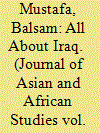

|
|
|
|
|
| Summary/Abstract |
This paper analyses five main slogans and chants performed during the first 3 months of Iraq’s 2019 Tishreen [October] protests. It aims to trace their origin to examine the transformation in the narratives created by each version. Drawing on a social approach to narrative and a social semiotic multimodal approach to communication, I treat slogans and chants as an evolving genre and performance, capable of triggering, constructing, and negotiating a different set of narratives in each adaptation. Such narratives arguably determine their impact. Unlike earlier versions, Tishreen chants and slogans succeeded in conjuring up collective and cross-sectarian narratives that could challenge master political narratives and heighten an Iraqi identity in the first place. It would, therefore, be hard to erase them from memory.
|
|
|
|
|
|
|
|
|
|
|
|
|
|
|
|
| 2 |
ID:
189938
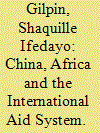

|
|
|
|
|
| Summary/Abstract |
The China–Africa relationship has received increased interest over the past few decades as scholars critically examine the challenge that China, in its quest for a closer strategic partnership with Africa, poses to the norms governing the neoliberal world order (NLWO). One crucial aspect of this is international aid, and how Chinese aid to Africa differs from Western aid. This paper argues that Chinese aid reduces the power of traditional aid donors to shape the development route of African countries. This new development finance ultimately breaks the monopoly of Western aid to decide how poor countries in the global ‘South’ develop. In doing so, the Sino–African aid relationship is challenging the current world order as it offers African states the possibility to decouple (or delink) themselves from the global economy. By challenging assumed neoliberal economic development fundamentals, this relationship, if harnessed correctly by African leaders, can pose longer-term ideological questions around the very set of ideas that underpin development itself, while enabling African states the policy space needed to pursue more sustainable development from an Afro-centric perspective. It is this possibility to delink, due to changing ideological fundamentals concerning economic development, that is the challenge China and Africa pose to the NLWO.
|
|
|
|
|
|
|
|
|
|
|
|
|
|
|
|
| 3 |
ID:
189946
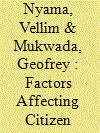

|
|
|
|
|
| Summary/Abstract |
Local governments are the bedrock for sound public administration because of their role in promoting bottom-up socio-economic development. Although Zimbabwe has made strides in ensuring citizens’ participation in local government processes, local authorities and other stakeholders still rely on the top-down approaches, marginalising the needs of the local citizens. The purpose of this paper is to determine the factors that affect the active participation of citizens in local governance in the Murewa District in Zimbabwe. Based on a multistage sampling approach, involving purposive sampling and stratified random sampling, interviews were conducted with 30 local government officials, while a questionnaire survey was administered to 396 citizens in four wards within the district. Complementary data were collected through focus group discussions and field observations. Thematic analysis was employed on data generated from interviews, focus group discussions and field observations, while the Statistical Package for the Social Sciences (Version 16) was used to analyse quantitative data from the questionnaire survey. The results show that more than 50% of the residents in the district felt that local government leadership side lined them in development planning. Some citizens reported that officials used development planning meetings to further their political agendas. The study recommends enhancement of citizen participation through citizen empowerment programmes such as educational and political leadership training programmes that transform the marginalised communities into autonomous communities that are capable of determining their own destiny.
|
|
|
|
|
|
|
|
|
|
|
|
|
|
|
|
| 4 |
ID:
189944


|
|
|
|
|
| Summary/Abstract |
This paper examines the linkages between moral categorisations on the international economic order and the dysfunctions that negate efforts at combating the Africa-Nigeria poverty conditions in the contemporary period. Drawing from the thesis of Ha-Joon Chang’s ‘Bad Samaritans’, it analyses the contradictions in the often-repeated declarations on ‘fight against poverty’ in Nigeria and the endemic dysfunctions in leadership and institutions that ought to play significant roles in understanding and recalibrating the hegemonic influence of wealthy nations who control the global economy.
|
|
|
|
|
|
|
|
|
|
|
|
|
|
|
|
| 5 |
ID:
189942


|
|
|
|
|
| Summary/Abstract |
In April 2015, a 7.8 magnitude earthquake hit the Gorkha district of Nepal. This was followed in May by a second earthquake. Nepal experienced another natural disaster in 2017. Floods affected large swathes of the country from east to west. Using both qualitative and quantitative data, this article examines the impact of these climate disasters on violence against women. In doing so, it adds to a small but growing and fundamentally important body of literature that explores the intersections of gendered violence and natural disaster. It is well-established that 35% of women worldwide have experienced physical and/or sexual violence. What we know much less about is how other events impact on these figures. Given the growing intensity of climate change and the reality that adverse impacts are here to stay, understanding the detrimental legacy of natural disasters is now more urgent than ever.
|
|
|
|
|
|
|
|
|
|
|
|
|
|
|
|
| 6 |
ID:
189949


|
|
|
|
|
| Summary/Abstract |
Human beings come from various backgrounds shaped by their norms, culture, belief systems, age, social orientation and their language. In addition to all these human beings, the common denominator is that they are different in terms of their parity and equality. This difference of human beings in the world has their own knowledge and cultural practices towards contribution of knowledge. Transformation of leadership which is imperative during the decolonialisation projects demands among other things more information about African traditional leadership. The realisation and existence of such leadership cannot be imagined without the indigenous knowledge which was and is still rich with ingredients of growing and leading African people to the right direction. Our South African context demands that women must also be uplifted to leadership roles in society and the workplace, but this usually collides with different African beliefs that still put women secondary to men, for instance, the issue of taboos which mainly promote the subjection of women. For the sake of this research, the focus is on those taboos which portray women as inferior to men in the society. Two cultures were selected for this purpose, Xitsonga and IsiZulu.
|
|
|
|
|
|
|
|
|
|
|
|
|
|
|
|
| 7 |
ID:
189941
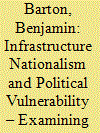

|
|
|
|
|
| Summary/Abstract |
The Bagamoyo Port Project (BPP) was meant to have set in motion the development of East Africa’s largest port. Yet, with the advent of former President John P. Magufuli to power in October 2015, the BPP has led a chequered existence. This article explores the dynamics behind the stalled talks over the BPP by emphasising Magufuli’s penchant for developmentalism, nationalism and authoritarianism ultimately as a political strategy designed to mask his vulnerable electoral standing within the party and with the electorate. The renegotiations over the BPP served as an ideal opportunity in this regard to shore up his base.
|
|
|
|
|
|
|
|
|
|
|
|
|
|
|
|
| 8 |
ID:
189939
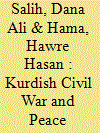

|
|
|
|
|
| Summary/Abstract |
The Kurdish Civil War between the military forces of the Kurdistan Democratic Party (KDP) and the Patriotic Union of Kurdistan (PUK) began in 1994. Despite frequently occurring peace talks throughout the conflict, negotiations failed to bring about a durable settlement until the United States brokered the Washington Peace Agreement in 1998. This research explores why the earlier negotiations were unsuccessful, and whether it was only the US mediation in 1998 which made the difference. Although the US mediation was clearly an important factor, by employing the contingency model this research argues that both contextual variables and process variables determined the success of negotiations in 1998. Furthermore, they can explain the failure of the previous 4 years of negotiations.
|
|
|
|
|
|
|
|
|
|
|
|
|
|
|
|
| 9 |
ID:
189940


|
|
|
|
|
| Summary/Abstract |
Using the example of neotoponyms proliferation in Tokombéré (Northern Cameroon) between 1970 and 2011, this paper questions the banal tactics of naming places as a site of public patriarchy contestation. In fact, young people play a crucial role in reinventing local political power forms of interpellation, which enables them to symbolically reappropriate the space. This helps to establish their presence in the public sphere from which they have been side-lined by social elders. Even though it reflects a political expression, the fact remains that the attribution of toponyms does not really help to reverse their domination into social field.
|
|
|
|
|
|
|
|
|
|
|
|
|
|
|
|
| 10 |
ID:
189948
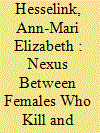

|
|
|
|
|
| Summary/Abstract |
This qualitative, phenomenological study explored four incarcerated adult females’ experiences that contributed to their human immunodeficiency viruses (HIV) status and acts of murder. The participants were purposely selected based on their HIV status and their crime, murder. Data were collected through one-on-one interviews and available secondary reports on the topic. The goal of this research was to answer two questions: (1) What contributed to the female participants’ HIV-positive status? and (2) How did the females’ HIV-positive status shape their crime of murder? A thematic analysis was used to analyse and identify the factors linked to the participants’ HIV status and their crime. The findings suggest irregular testing of HIV/acquired immunodeficiency syndrome (AIDS), promiscuous behaviour, partner infidelity and ignorance of partners’ HIV status as contributory factors to the females’ HIV-positive status. Specific childhood-related and adulthood-related factors explain the murder of the participants’ partners/spouses.
|
|
|
|
|
|
|
|
|
|
|
|
|
|
|
|
| 11 |
ID:
189947


|
|
|
|
|
| Summary/Abstract |
A new wave of attacks by Sinhala-Buddhist extremist elements against the Muslim community in Sri Lanka started following the brutal end of the ethnic civil war between the Liberation Tigers of Tamil Eelam (LTTE) and the Sinhala-Buddhist-dominated Sri Lanka security forces in 2009. Easter Sunday terrorist attacks in 2019 by some Muslims polarized Sri Lanka and contributed to the compromise of the country’s security. Sri Lankan Muslims often claim they are a peaceful community and thus have no serious interests in violent mobilization. But the evidence would basically contradict Muslims’ claim of a peace-loving community. The Easter Sunday terrorist attacks did not take place in any vacuum. This paper will situate some key developments in the violent mobilization of Sri Lanka during the war against the LTTE. The primary goal of such an attempt is to read the growing religious conservative and violent trends among Muslims between 1977 and 2009. In understanding the growing religious conservative trends, an understanding is attempted to situate a later propensity for violence within the community that would manifest itself with the 2019 Easter Sunday attacks. Interviews were conducted with members of the Islamic Dawah organizations and Muslim youth who were formerly associated with violent groups in the Eastern Province to understand the ground reality. The period of 1977–2009 is important as the rise of religious conservatist influences in Sri Lanka mirrors the global transnational influences of Iran and Middle East Petro Dollars, especially Saudi Arabia. The article draws mainly on secondary sources. But to gain a better understanding of the ground reality, we spoke to a few Eastern Muslims between July 2016 and September 2021 at regular intervals.
|
|
|
|
|
|
|
|
|
|
|
|
|
|
|
|
| 12 |
ID:
189943


|
|
|
|
|
| Summary/Abstract |
Each year, the Ministry of Foreign Affairs (MoFA), Pakistan issues a special 10-day hunting permit to royal family members of Gulf countries for seasonal hunting of Asian Houbara bustard (Chlamydotis macqueen). This paper attempts to systematically present the understandings on seasonal land grabbing and its political economy in Pakistan. The role of local elites and government institutions and the response of local people, as well as their resistance, is discussed in detail.
|
|
|
|
|
|
|
|
|
|
|
|
|
|
|
|
|
|
|
|
|